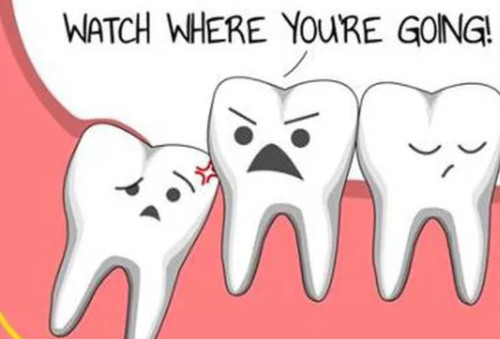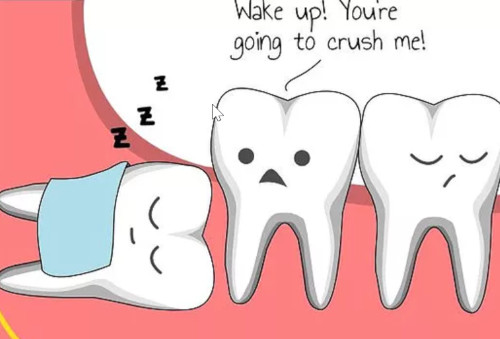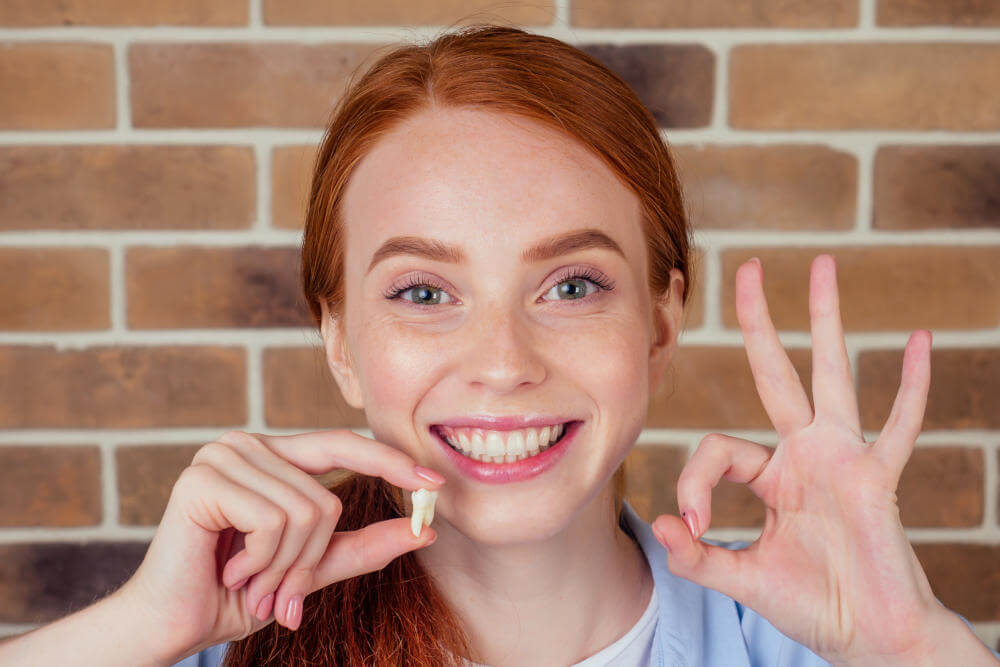Expertise with even the most complicated
impacted wisdom teeth cases!
Because wisdom teeth are the final set of teeth to appear after all other adult teeth have been settled into place for years, they are the most likely to cause a variety of issues. Without adequate space to erupt, impacted wisdom teeth are a common problem for many people. Even when they are able to break the surface, chances are that your wisdom tooth may grow in sideways or cause overcrowding in the jaw, resulting in jaw pain, tooth decay, gum disease and infection, and even cause damage and alignment issues to neighboring teeth.
Usually, the most common course of treatment for all of the above diagnoses will involve wisdom tooth extraction to eliminate the cause of the issue. For an erupted wisdom tooth, a standard tooth extraction will be performed. However, surgical extraction will be necessary in the case of an impacted wisdom tooth.



Not all wisdom teeth need to be removed. As long as the tooth erupts cleanly without causing damage or crowding to other teeth and is accessible for daily hygiene practices such as brushing and flossing, you will not require an extraction.
Circumstances surrounding the need for wisdom tooth extraction usually involve shortage of space within the jaw that either prevents proper eruption of the tooth, causes other teeth to become damaged or misaligned, or causes the tooth to erupt in a way that prevents access to the tooth or surrounding teeth for proper hygienic care. An example may include an angular wisdom tooth eruption where the tooth grows in sideways. This places pressure on the remaining teeth causing damage and misalignment, headaches, jaw pain, and also makes it difficult to keep teeth clean. The wisdom tooth may also develop in a sac within the jawbone producing cysts or even benign tumors that cause damage and partially erupted or impacted wisdom teeth are notoriously difficult to keep clean and can often result in gum disease. In some cases, a wisdom tooth may require emergency extraction due to a severe infection. If you are experiencing red, swollen gum tissue near your very back teeth along with a bad taste and smell, pain when biting down, and possibly even draining pus, contact your dentist immediately for an emergency procedure. Left unattended, wisdom tooth infection can radiate to the ear causing ear and sinus infections, so it is important to seek care immediately if you suspect an infection.
Wisdom teeth extraction is a process that can take up to 45 minutes depending on complexity and can take two forms; the conventional tooth extraction method for erupted teeth, or surgical extraction for an impacted wisdom tooth.
For a surgical tooth extraction, the procedure should be performed by a qualified oral surgeon who is also skilled in anesthesia such as our in-house oral surgery specialist. The process will usually begin with the application of a local anesthetic. Depending on the degree of invasiveness of the surgery, this may be supplemented with nitrous oxide to help you relax and maybe even doze, or IV sedation to help you sleep throughout the entire procedure. Alternately, you may choose to go under general anesthesia which will put you to sleep through the whole procedure and take about an hour post-surgery to wake up. This may also be administered intravenously or by breathing in gas via a mask. Extraction of an erupted wisdom tooth is a fairly straight forward process where specialized tools are employed to securely hold the tooth and rock it back and forth within its socket until it detaches. Surgical tooth extraction for an impacted tooth will involve the removal of tissue and cutting of the bone that covers the tooth to create a small opening. The tooth will usually be cut into pieces through this opening to minimize cutting of bone tissue, then thoroughly removed before suturing back up with several stitches to close the surgical site and promote healing of the surrounding gum tissue.
Depending on the type of anesthesia you had for your wisdom tooth removal and your personal response to the anesthetic, you may feel alert directly after your procedure, or you may be very drowsy and require somebody to drive you home.
Likewise, the level and duration of pain will vary from person to person and also depend on the invasiveness of the procedure. Some people may experience little to no pain and be able to drive themselves straight to work, while others may need to take some pain medication such as Tylenol or a mild narcotic and rest at home for the remainder of the day. Typically, complete recovery after wisdom tooth removal can take from three to five days. During the first day, you may experience light bleeding from the surgical site which should subside within the first 24 hours. As the anesthesia wears off, you may experience some pain, stiffness of the jaw, and possibly some difficulties in opening your mouth. This should reduce over the next couple of days, downgrading to some swelling and mild discomfort. Severe and persistent pain is not normal, and you should contact your dentist or oral surgeon immediately if you experience such symptoms. For effective tooth extraction aftercare, we recommend that patients eat soft foods and avoid spicy foods, drinking through a straw, harsh rinsing, excessive exercise, and alcohol and tobacco use for the first 3-5 days. To help with swelling, you can apply an ice pack, and to relieve stiffness, try opening and closing your mouth gently to exercise and loosen the jaw.
What Causes Wisdom Tooth Pain?
There can be a number of circumstances surrounding wisdom tooth pain, but the underlying factor that is prevalent in virtually all patients is lack of space. Human jaws have become smaller over time, leaving less and less room for the mouth to accommodate for wisdom teeth when they do come in. This can lead to impaction, pressure upon other teeth causing damage and misalignment, infections, jaw pain, and even headaches, resulting in wisdom teeth surgery being one of the most common oral surgery procedures performed.
When Do Wisdom Teeth Come In?
Our set of third molars are more commonly known as wisdom teeth, and are the final set of teeth to erupt, as well as the most posterior teeth in the dental arch. Typically developing between the ages of 17 and 21, it is possible for some adults to never see their wisdom teeth coming in, and also for some to develop more than the usual set of four.
Life After Wisdom Teeth Removal
According to Healthline Magazine, wisdom teeth are no longer totally necessary due to human advancements in cutting and crushing utensils as well as cooking. Healthline states that anthropologists believe humans to have evolved beyond the need for wisdom teeth, and indeed, many people today don’t ever see their wisdom teeth coming in (as many as around 47% of adults 25 years and older according to a 2013 study). If you have had wisdom teeth surgery, you can continue to expect normal function in chewing and speaking, and no visual changes or facial distortions to occur after wisdom teeth removal.

For our ancestors, wisdom teeth were important. This final set of molars helped them to chew raw meat properly.
But with evolution, people started eating cooked food. And soon, it reduced the need for those molars. So much so that they are now considered vestigial organs by many. But these teeth still appear, bringing suffering and complications along with them.
Though not all people suffer, these molars make life miserable for many. From swollen gums to unbearable pain, the list continues. Why suffer so much for something redundant?
Keeps Your Gums Healthy
The earlier you remove your wisdom teeth, the safer your gum remains. If allowed to stay, wisdom teeth can create a breeding ground for bacteria inside your mouth. And with time, the infection spreads. The gum tissue suffers, and so do the nearby teeth. The infection also multiplies the pain one suffers at the time of its extraction. Not to mention the periodontal disease it can leave behind for you to tackle. Removing them will help you protect your mouth from all these problems.
Avoids Overcrowding
Your teeth generally do not need the company of those extra molars. They are quite comfortable with the space they have. Thus, they become irritated when these molars pressurize to give them space. After all, who likes unnecessary crowding?
These molars are often responsible for the overcrowding of straight teeth and their misalignment. They can also disturb your chewing pattern and lead to pain and headache. Besides, they can also affect your bite and smile. Imagine the pain it causes to those who wore braces for years to rectify their teeth alignment, only to have their wisdom tooth pour cold water on all their efforts.
Businesses can get a lot of benefits by using a website. It is easy to create and affordable. Get in touch with our web design experts in Ottawa to get a no-obligation quote.
Reduces Chances of Cavities
Wisdom teeth often lead to inflammation and other dental diseases. First, they weaken the roots of surrounding teeth and make them prone to cavities. Second, they remain vulnerable to cavities due to their location inside the mouth. It is very hard to reach them and clean them properly. Thus, when cavities develop, it becomes hard to treat them as well. And soon, the cavities spread to the nearby teeth. This worsens the overall health of your mouth. Their early removal often decreases the chances of cavities.
Eliminates Pain
Even before they erupt, these pesky molars can start causing pain, and the discomfort only escalates with each passing day as the increased pressure on your gum and other teeth adds to the pain. It may be difficult to chew properly and you may have to let go of many of your favorite food items. At times the pain does not remain limited to your mouth, but you may start getting severe headaches. If you are suffering from any of these symptoms, it is necessary to visit your dentist and have your wisdom teeth extracted as soon as possible.
Cysts and Tumors
If not removed at an early stage, wisdom teeth can pave the way for tiny cysts and tumors inside your mouth. They can even invade your jawbone, causing immense pain, and in sever situations, you may suffer from temporomandibular joint and muscle disorders. Early removal of these molars can prevent such complications.
Following certain steps ensure fast recovery and less pain after wisdom teeth removal. Here is a list of a few dos and don’ts
Dos
- After wisdom teeth removal, it is important to keep your head elevated in order to decrease any swelling. Also, make sure to ice your face for the first 24 to 48 hours. This will also minimize swelling and soothe your pain. Dentists usually recommend patients to take it easy on the first couple of days following surgery. Immediately after the procedure, you will need to have some to take you home. Meanwhile, be sure to keep the gauze in place until bleeding has subsided.
- Eat food that needs minimal chewing and will not put any extra pressure on your mouth after the surgery. For the first day, opt only for soft food like pudding, yogurt, and so on. Also, drink plenty of water. Slowly shift to harder food when you start healing. Brush only a day after the surgery and do not touch the extraction site. You may rinse your mouth with saltwater. Remember to take any prescription or over the counter medications recommended by your dentist on time. Missing a dose can increase the pain and worsen the situation. Also, perform jaw exercises as recommended by your dentist.
Don'ts
- Do not use straws for drinking. It involves a sucking motion that can loosen blood clots and intensify your pain. Also, do not spit even if bleeding happens. Dentists will apply a gauze to soak the blood. Change it if needed. In case you spit, chances are high that it will dislodge blood clots at the socket.
- Avoid tobacco, alcohol, hot and caffeinated drinks for the first 24 hours as these may increase the risk of complications. Also, do not eat hard foods for at least one week since they can interfere with the healing process. Remember not to brush your teeth for the first 24 hours as the movement can disrupt the stitches. Also, avoid vigorous movement while rinsing your mouth.
High-quality Service
The doctors at Diamond Coast Dental take immense care when removing a wisdom tooth. With your comfort as a high priority, we also have high levels of expertise in anesthesiology and aim to reduce your pain as much as possible during the surgery. Here, the staff take care of your medical needs and ensure you have a positive experience.
Priority to Safety
Depending on the age of your wisdom tooth, complications may arise. The more you delay, the higher the chances of infection. Being experienced professionals at Huntington Beach, we know how to prioritize your safety. All staff members are highly trained in standards prescribed by the American Dental Association, among other institutions. We sterilize all the equipment after every use and keep cross-contamination at bay.
Skilled Professionals
Dr. Hien Nguyen and Dr. Jefferey Pham belong to the team of specialists at Diamond Coast Dental. The clinic’s professionals have dedicated themselves to excellent services. Such is the commitment that the staff often attend meetings and lectures to keep themselves educated on the latest developments in dentistry. No new technique or product can miss their attention. We grasp any opportunity that can improve the wisdom tooth removal surgery’s efficiency.
Pleasant Environment and Amiable Staff
Wisdom tooth removal is not always an easy procedure. Hence, the staff ensures that you are at ease during the process. We create a relaxing environment to reduce your stress. You will always find pleasant aromas and music at this Huntington Beach clinic. Here, the staff always greet every patient with a smile.
Post-surgery Care
There are certain precautions that one has to follow after removing a wisdom tooth. Our doctors are committed to properly guiding all patients with a detailed list of the dos and don’ts. In case of any complications, we are always here to give you the best follow-up care.
Located in Huntington Beach, you can easily reach our clinic from Monday to Saturday. We are open on Monday, Tuesday, and Friday from 10 am. On the remaining days, we are open from 9 am.
For a consultation, you can contact us at (714)375-3222.